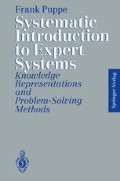Abstract
Heuristic classification is suitable for classification problems in which it is known from experience which observations— or combinations of observations — indicate intermediate or final solutions, and with what degree of certainty. Thus the basic object types are observations, solutions and rules of the form “observation indicates solution” (O → S, with certainty x). That solution is selected which has the highest total score on the basis of the observations (Fig. 15.1).
Access this chapter
Tax calculation will be finalised at checkout
Purchases are for personal use only
Preview
Unable to display preview. Download preview PDF.
References
Boose, J.: Personal Construct Theory and the Transfer of Human Expertise, AAAI-84, 27–33, 1984.
Boose, J. and Bradshaw, J.: Expertise Transfer and Complex problems: Using AQUINAS as a Knowledge-Acquisition Workbench for Knowledge-Based Systems, International Journal of M an-Machine Studies 26, 3–28, 1987.
Chandrasekaran, B. and Mittal, S.: Conceptual Representation of Medical Knowledge for Diagnosis by Computer: MDX and Related Systems, Advances in Computers 22, 217–293, 1983.
Clancey, W.: Classification Problem Solving, AAAI-84, 49–55, 1984.
ESS: Two Problem-Specific Tools for Diagnosis, Expert System Strategies 4, 7–12,1988.
Gappa, U.: CLASSIKA, a Knowledge Acquisition Tool for Use by Experts, Proceedings of the AAAI Workshop on Knowledge Acquisition, Banff, Canada, 1989.
Puppe, F. and Puppe, B.: Overview on MED1: an Heuristic Diagnostics Expert System with an Efficient Control Structure, GWAI-3, Springer Informatik-Fachberichte 76, 11–20, 1983.
Puppe, F.: Diagnostic Problem Solving with Expert Systems (in German), Springer Informatik-Fachberichte 148, 1987 (a).
Puppe, F.: Requirements for a Classification Expert System Shell and their Realization in MED2, Applied Artificial Intelligence 1, 163–171, 1987 (b).
Puppe, F. and Gappa, U.: Towards Knowledge Acquisition by Experts, Proc. of 5th IEA/AIE (Industrial and Engineering Applications of Artificial Intelligence and Expert Systems), Springer, Lecture Notes in Artificial Intelligence 604, 546–555, 1992.
Van Melle, W.: System Aids in Constructing Consultation Programs, UMI Research Press, 1981.
Walser, P.: Formalization of Heuristic, Causal, Case-Based and General Knowledge for a Tutorial Diagnostic Expert System Exemplified with the Automobile Motor Domain (in German), Diploma Thesis, University of Karlsruhe, Institute of Logic, 1991.
Weis, S. and Kulikowski, C.: A practical Guide to Designing Expert Systems, Roman k Allanheld, 1984.
Author information
Authors and Affiliations
Rights and permissions
Copyright information
© 1993 Springer-Verlag Berlin Heidelberg
About this chapter
Cite this chapter
Puppe, F. (1993). Heuristic Classification. In: Systematic Introduction to Expert Systems. Springer, Berlin, Heidelberg. https://doi.org/10.1007/978-3-642-77971-8_15
Download citation
DOI: https://doi.org/10.1007/978-3-642-77971-8_15
Publisher Name: Springer, Berlin, Heidelberg
Print ISBN: 978-3-642-77973-2
Online ISBN: 978-3-642-77971-8
eBook Packages: Springer Book Archive

